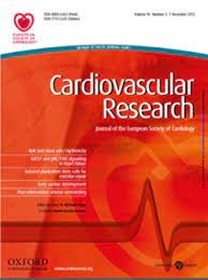Loss of MRAP2 in MC4R neurons protect from obesity-associated autonomic and cardiovascular dysfunctions
IF 10.2
1区 医学
Q1 CARDIAC & CARDIOVASCULAR SYSTEMS
引用次数: 0
Abstract
Aims The melanocortin receptor accessory protein 2 (MRAP2), which is abundantly expressed in the brain including the hypothalamus, has emerged as a key regulator of melanocortin-4 receptor (MC4R) activity. We sought to delineate the physiological significance of MRAP2 in MC4R neurons, with a particular focus on autonomic and cardiovascular functions. Methods and Results Selective deletion of MRAP2 in MC4R neurons causes obesity that was associated with hyperphagia and impairment in glucose homeostasis and insulin sensitivity. MC4R agonist Melatonan II (MTII)-induced anorectic effects were blunted in mice lacking MRAP2 in MC4R neurons, whereas Celastrol retained its efficacy in reducing food intake and body weight. MRAP2 deletion also reduced baseline sympathetic nerve activity (SNA), particularly the SNA subserving the kidney. This was associated with reduced innervation of the kidney. In addition, MTII-induced increases in renal and brown adipose tissue (BAT) SNA as well as hepatic vagal nerve activity were significantly attenuated in MC4R neuron MRAP2-deficient mice. Anatomical tracing revealed that MC4R neurons projecting to BAT and kidneys were localized to specific brain nuclei including the paraventricular nucleus of the hypothalamus, providing anatomical substrate for MRAP2 regulation of sympathetic outflow. Although loss of MRAP2 in MC4R neurons did not affect arterial pressure, it caused a significant decrease in heart rate and baroreflex sensitivity. Finally, MRAP2 deficiency in MC4R neurons attenuated MTII-induced increase in arterial pressure and heart rate. Conclusion These findings demonstrate that in addition to its role in energy balance and glucose homeostasis MRAP2 in MC4R neurons is crucial for cardiovascular autonomic regulation and is required for the development of obesity-associated hypertension and autonomic dysfunction.MC4R神经元中MRAP2的缺失可以防止肥胖相关的自主神经和心血管功能障碍
黑素皮质素受体辅助蛋白2 (MRAP2)在包括下丘脑在内的大脑中大量表达,已成为黑素皮质素-4受体(MC4R)活性的关键调节因子。我们试图描述MRAP2在MC4R神经元中的生理意义,特别关注自主神经和心血管功能。方法与结果MC4R神经元中MRAP2的选择性缺失导致肥胖,与贪食、葡萄糖稳态和胰岛素敏感性受损有关。MC4R激动剂褪黑素II (MTII)诱导的厌食效应在MC4R神经元中缺乏MRAP2的小鼠中被减弱,而雷公藤红素在减少食物摄入和体重方面保持其功效。MRAP2缺失也降低了基线交感神经活动(SNA),特别是服务于肾脏的SNA。这与肾脏神经支配减少有关。此外,mtii诱导的MC4R神经元mrap2缺陷小鼠肾脏和棕色脂肪组织(BAT) SNA以及肝脏迷走神经活动的增加显著减弱。解剖示迹显示,投射到BAT和肾脏的MC4R神经元定位于包括下丘脑室旁核在内的特定脑核,为MRAP2调控交感神经流出提供了解剖学基础。虽然MC4R神经元中MRAP2的缺失不影响动脉压,但它会导致心率和压力反射敏感性的显著降低。最后,MC4R神经元中MRAP2缺失减弱了mtii诱导的动脉压和心率升高。结论MC4R神经元中的MRAP2除了在能量平衡和葡萄糖稳态中发挥作用外,还对心血管自主调节至关重要,并且是肥胖相关性高血压和自主神经功能障碍的发生所必需的。
本文章由计算机程序翻译,如有差异,请以英文原文为准。
求助全文
约1分钟内获得全文
求助全文
来源期刊

Cardiovascular Research
医学-心血管系统
CiteScore
21.50
自引率
3.70%
发文量
547
审稿时长
1 months
期刊介绍:
Cardiovascular Research
Journal Overview:
International journal of the European Society of Cardiology
Focuses on basic and translational research in cardiology and cardiovascular biology
Aims to enhance insight into cardiovascular disease mechanisms and innovation prospects
Submission Criteria:
Welcomes papers covering molecular, sub-cellular, cellular, organ, and organism levels
Accepts clinical proof-of-concept and translational studies
Manuscripts expected to provide significant contribution to cardiovascular biology and diseases
 求助内容:
求助内容: 应助结果提醒方式:
应助结果提醒方式:


